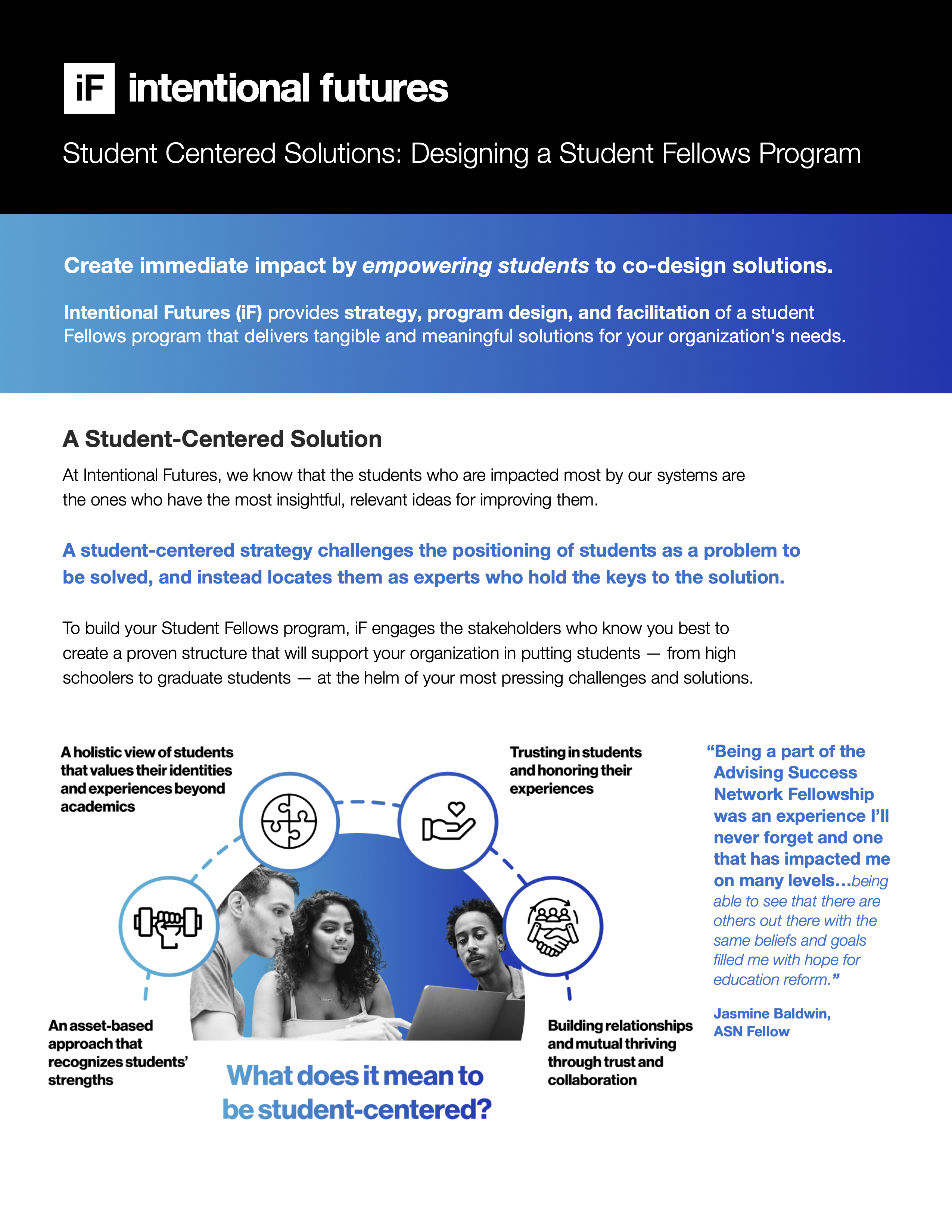Creating systemic solutions by putting students in the lead
At Intentional Futures, we know that the students who are impacted most by our systems are the ones who have the most insightful, relevant ideas for improving them. Intentionally creating opportunities to put students at the helm of your most pressing organizational questions is a revolutionary way to benefit both your organization, and the students you serve.
iF-designed Student Fellowship programs provide student stakeholders with hands-on experience, mentorship, and networking opportunities, preparing them for future careers while also centering diversity, equity, and inclusion. Fellows have a positive impact on the wider community by addressing critical needs and promoting social impact - all while being empowered, as students, to take the lead. By investing in fellowship programs, organizations can solve important problems, develop a pool of potential future employees, and enhance their reputation as a socially responsible and engaged organization.

Over the past three years, the iF education team has partnered with a variety of organizations, including the Every Learner Everywhere Network and the Advising Success Network, in developing and implementing their own flagship fellowship programs. With the learnings (and mistakes) derived from those experiences, we’re sharing some of the lessons we took away from the process of working with a wide array of partners, students, and materials.
1. Create an equitable application and review process
It is essential to design an application and review process that is accessible to all students, no matter their GPA or previous work experience. Traditional methods such as requiring students to submit resumes or having a minimum GPA requirement may exclude qualified students who have not had the same access to opportunities as others. Instead, consider assessing applications more holistically to ensure all students have an equal opportunity to participate.
2. Clearly communicate with students
Clear communication is key to building trust and setting students up for success. From defining the criteria used to evaluate student applications to explaining day-to-day expectations, tasks, and organization of the fellowship, ensure that all communication is easily understandable and transparent. This will not only increase student engagement but also reduce confusion and misunderstandings.
3. Be realistic about the time commitment required to participate
It is crucial to set project goals, timelines, milestones, and expectations well ahead of time. This will help students plan their engagement with the fellowship and ensure they can commit to the program. Be clear about the time commitment required and provide support to students to help them manage their workload effectively.
4. Compensate students for their time and contributions
Unpaid internships have long been the standard in many industries. However, they are only accessible to students who have the financial privilege to take on an unpaid opportunity. To ensure equity, consider compensating students for their time and contributions. This not only acknowledges the value of their work but also helps to level the playing field for students from different socio-economic backgrounds.
5. Put aside personal ego
It is essential to engage students with an attitude of curiosity and learning, taking accountability, and having follow-through for mistakes. Students recognize when they are being engaged authentically or not, and offering basic respect to students goes a long way. Avoid imposing personal beliefs or attitudes on the students and prioritize their growth and learning.
Running a student fellowship program can be a great opportunity to engage with students, foster growth, and create meaningful impact. By following best practices and avoiding common pitfalls, program organizers can ensure success and create an equitable and empowering experience for all students.
Consider partnering with iF in creating a Fellows program for your organization or institution. Download more information here.
Access a worksheet for planning and acting on fellowship goals and deliverables here.
